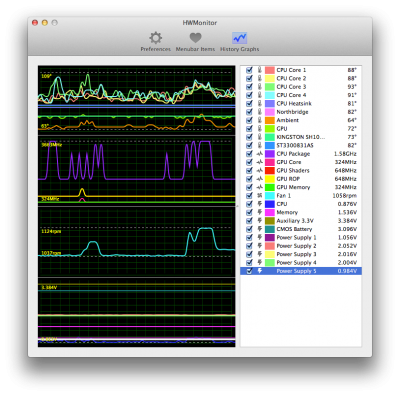To measure the power your PSU is supplying, you need to hook up current meters into each and every output circuit going from the PSU to the motherboard, GPU, drives, fans, etc. Derive the power by multiplying the current with the voltage, add them all up, and there's your answer. Obviously this isn't very convenient.
But it would allow you to see when your PSU is getting close to the current limit for each of its outputs (the "650W" is the sum of all of them: for example if you had something sucking too much power from the 3.3V rail the PSU could be overloaded even if it wasn't anywhere near 650W total).
For a coarser answer you can instead plug the computer into an AC "watt meter". "Kill-A-Watt" is one US model. I just picked up a power meter from my local Jaycar store. This will give you the power the PSU is
drawing (which due to inefficiencies in the PSU design will always be slightly greater than the PSU
output).
On lammergeier with an i7 OC'ed to 4.4 GHz, 32 GB RAM, 2x SSD, 7xHDD, GTX 650, under heavy load with all the disks being hammered, Prime95
and Unigine Heaven running, I haven't been able to get the power draw above
390W. Obviously this workload is an extreme case not indicative of real-world use.

Your GTX 650 Ti should draw up to ~45W more than my GTX 650, but even so I would expect your 650W PSU should be having no trouble.
If your system is loud, that doesn't necessarily have a relationship with the PSU being under load.
If you can control the speed of your fans and slow them down while still moving enough air to let the heatsinks inside do their work, you can drop the noise significantly. Replacing the fans with quieter models can help too.
The fan on the GTX 650 Ti will be producing some noise too. With the case open you can press with your fingers on the hub of the fan and slow it down to stopped to see how much. You can keep an eye on the GPU and system temps in HWMonitor while you do this, but no matter what you'll want to release it after a second or two to make sure the cooling works. Make sure you're not pushing the fan off-balance though, as that can harm the fan. If you want you do have the option of replacing the fan and heatsink on that EVGA GTX 650 Ti with a quieter cooler such as something from Arctic Cooling. In lammergeier I've used an Arctic Accelero S1 Plus which is completely fanless, and is rated for the power level of the GTX 650 Ti. It does need some airflow through the case though.
Other noise producers in the case will include:
- PSU
- CPU cooler - I use an NH-D14 but there are other quiet options
- HDD - that old drive is probably producing a lot of noise, but usually you only notice when you turn it off and the power goes away
You'll need to work out which of the noise-makers is the biggest culprit. But I warn you, it's a slippery slope. Once you've fixed the noisiest component you'll be more aware of the next noisiest component, and before long you'll be annoyed at noise levels that a month ago you didn't even notice!


